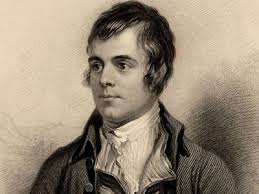Fables: 2 The Cock and the Jasp
Ane cok sumtyme with feddram fresch and gay,
Richt cant and crous albeit he was bot pure,
Flew furth upon ane dunghill sone be day.
To get his dennar set was al his cure.
Scraipand amang the as be aventure
He fand ane jolie jasp richt precious
Wes castin furth in sweping of the hous.
As damisellis wantoun and insolent
That fane wald play and on the streit be sene,
To swoping of the hous thay tak na tent
Quhat be thairin swa that the flure be clene,
Jowellis ar tint as oftymis hes bene sene
Upon the flure and swopit furth anone.
Peradventure sa wes the samin stone.
Sa mervelland upon the stane, quod he,
“O gentill jasp, O riche and nobill thing,
Thocht I thee find, thow ganis not for me.
Thow art ane jowell for ane lord or king.
It wer pietie thow suld in this mydding
Be buryit thus amang this muke and mold
And thow so fair and worth sa mekill gold.
“It is pietie I suld thee find for quhy
Thy grit vertew nor yit thy cullour cleir
I may nouther extoll nor magnify,
And thow to me may mak bot lyttill cheir,
To grit lordis thocht thow be leif and deir.
I lufe fer better thing of les availl
As draf or corne to fill my tume intraill.
“I had lever ga skraip heir with my naillis
Amangis this mow and luke my lifys fude
As draf or corne, small wormis or snaillis,
Or ony meit wald do my stomok gude
Than of jaspis ane mekill multitude,
And thow agane upon the samin wyis
May me as now for thin availl dispyis.
“Thow hes na corne and thairof I had neid.
Thy cullour dois bot confort to the sicht
And that is not aneuch my wame to feid
For wyfis sayis that lukand werk is licht.
I wald sum meit have, get it geve I micht,
For houngrie men may not weil leif on lukis.
Had I dry breid, I compt not for na cukis.
“Quhar suld thow mak thy habitatioun,
Quhar suld thow dwell bot in ane royall tour,
Quhar suld thow sit bot on ane kingis croun,
Exaltit in worschip and in grit honour?
Rise, gentill jasp, of all stanis the flour,
Out of this fen and pas quhar thow suld be.
Thow ganis not for me nor I for thee.”
Levand this jowell law upon the ground
To seik his meit this cok his wayis went;
Bot quhen or how or quhome be it wes found
As now I set to hald na argument,
Bot of the inward sentence and intent
Of this fabill as myne author dois write
I sall reheirs in rude and hamelie dite.
Moralitas
This jolie jasp hes properteis sevin.
The first, of cullour it is mervelous,
Part lyke the fyre and part is lyke the hevin.
It makis ane man stark and victorious,
Preservis als fra cacis perrillous.
Quha hes this stane sall have gude hap to speid.
Of fyre nor fallis him neidis not to dreid.
This gentill jasp richt different of hew
Betakinnis perfite prudence and cunning
Ornate with mony deidis of vertew
Mair excellent than ony eirthly thing,
Quhilk makis men in honour ay to ring,
Happie and stark to haif the victorie
Of all vicis and spirituall enemie.
Quha may be hardie, riche, and gratious?
Quha can eschew perrell and aventure?
Quha can governe ane realme, cietie, or hous?
Without science, no man, I yow assure.
It is riches that ever sall indure
Quhilk maith nor moist nor uther rust can freit.
To mannis saull it is eternall meit.
This cok, desyrand mair the sempill corne
Than ony jasp, may till ane fule be peir
Makand at science bot ane knak and scorne
And na gude can, als lytill will he leir.
His hart wammillis wyse argumentis to heir
As dois ane sow to quhome men for the nanis
In hir draf troich wald saw the precious stanis.
Quha is enemie to science and cunning
Bot ignorants that understandis nocht
Quhilk is sa nobill, precious, and ding
That it may with na eirdlie thing be bocht.
Weill wer that man over all uther that mocht
All his lyfe dayis in perfite studie wair
To get science for him neidit na mair.
Bot now allace this jasp is tynt and hid.
We seik it nocht nor preis it for to find.
Haif we richis, na better lyfe we bid,
Of science thocht the saull be bair and blind.
Of this mater to speik, it wair bot wind,
Thairfore I ceis and will na forther say.
Ga seik the jasp quha will for thair it lay.
